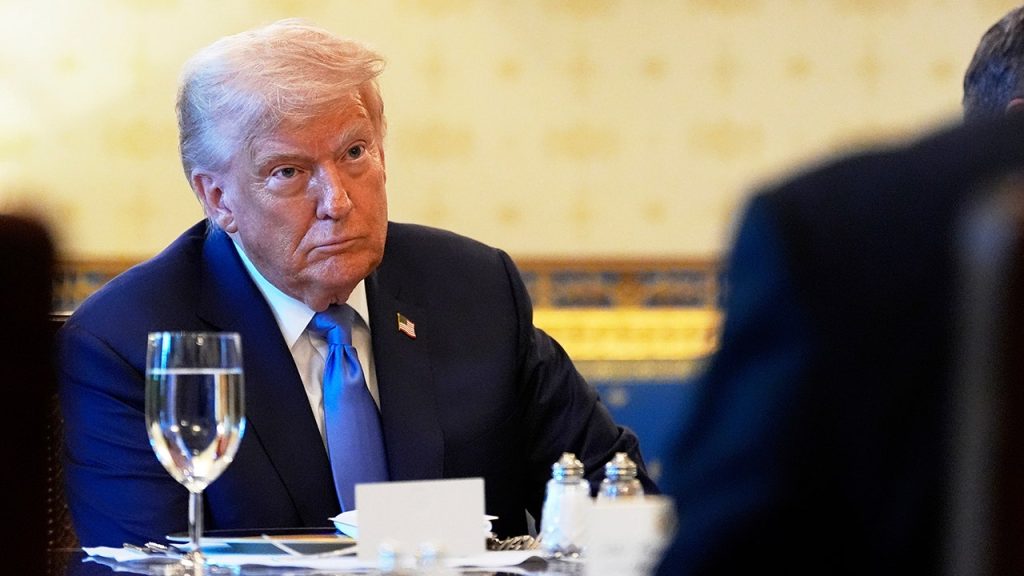In a significant policy shift, former President Donald Trump announced on Monday that the United States would be supplying defensive weapons to Ukraine as it combats the ongoing Russian invasion. This reversal follows a recent decision by the Pentagon to pause certain military deliveries, amid escalating violence that left at least 11 civilians dead and over 80 injured in Ukraine. The announcement was made during a White House dinner with Israeli Prime Minister Benjamin Netanyahu, where Trump emphasized the urgent need for Ukraine’s defense capabilities.
| Article Subheadings |
|---|
| 1) Context of Military Support to Ukraine |
| 2) The Current State of Hostilities |
| 3) U.S. Response to Ukraine’s Requests |
| 4) Russia’s Reaction to U.S. Involvement |
| 5) Political Implications of Military Aid |
Context of Military Support to Ukraine
The Biden administration has long supported Ukraine in its fight against Russian aggression through a series of military aid packages. However, the recent decision by the Pentagon to halt certain shipments raised concerns regarding the U.S. commitment to Ukraine’s defense. Trump’s announcement on Monday indicates a renewed effort to support the beleaguered nation. Observers note that the infusion of defensive weapons is critical at this juncture, as it could enhance Ukraine’s military capabilities. Officials confirmed that the situation remains fluid, with discussions ongoing regarding the degree and types of military assistance to be provided.
The Current State of Hostilities
As of now, Russian forces have captured nearly one-fifth of Ukrainian territory, with significant gains in regions such as Crimea and Luhansk. An intensified aerial assault was reported recently, during which Russia launched its largest attack yet, with nearly 500 drones and dozens of missiles targeting urban centers across Ukraine. Tragically, these assaults resulted in civilian casualties, further complicating an already dire humanitarian situation. Amidst this background, Trump’s comments regarding increased military aid come as a critical point for Ukraine’s defense strategy.
U.S. Response to Ukraine’s Requests
In recent weeks, Ukrainian officials have expressed urgent needs for more advanced weaponry, specifically requesting additional Patriot missile systems and artillery. These tools are considered vital for Ukraine to combat increasingly frequent airstrikes. Trump confirmed that his administration would act on these requests, asserting that “they have to be able to defend themselves.” The Pentagon later clarified that it would expedite the delivery of these defensive weapons to ensure Ukrainian forces are sufficiently equipped for upcoming engagements. This assistance not only aims to bolster Ukraine’s on-ground defenses but simultaneously serves to reassure allies in the Western bloc.
Russia’s Reaction to U.S. Involvement
In response to the potential increase in U.S. military support for Ukraine, the Kremlin expressed skepticism over the effectiveness and consistency of U.S. assistance. Kremlin spokesman Dmitry Peskov remarked that many contradictory statements regarding U.S. support create uncertainty. Nevertheless, he acknowledged the ongoing flow of European weapons to Ukraine. This reaction exemplifies the Kremlin’s broader strategy to downplay Western influence while maintaining its narrative on the so-called “special military operation” in Ukraine. Additionally, Peskov highlighted the potential for resuming economic relations with the United States, indicating a possible willingness for diplomatic maneuvering amidst military tensions.
Political Implications of Military Aid
The implications of Trump’s recent statements cannot be understated. His call for increased military support aligns with prevailing sentiments among several U.S. lawmakers who advocate for stronger backing of Ukraine. However, Trump’s previous attempts at negotiating peace with Russia have yet to yield results, casting doubts on the feasibility of diplomatic solutions. Political analysts suggest that this move could also be a calculated effort on Trump’s part to reassert his authority in international matters, positioning himself as a decisive leader in an era of escalating geopolitical tensions. This narrative aligns with his broader campaign themes of strengthening the U.S. military and demonstrating a tough stance against adversarial nations.
| No. | Key Points |
|---|---|
| 1 | Former President Donald Trump announced a shift towards supplying defensive weapons to Ukraine. |
| 2 | At least 11 civilians were killed and over 80 injured due to Russian attacks on Ukraine. |
| 3 | Ukraine is urgently requesting Patriot missile systems and artillery to defend against Russian airstrikes. |
| 4 | Kremlin officials expressed skepticism about U.S. military support and highlighted ongoing European arms supplies. |
| 5 | Trump’s policy shift has significant political ramifications, emphasizing the importance of U.S. military engagement in global crises. |
Summary
The unfolding situation regarding U.S. military support for Ukraine represents a critical moment in ongoing international conflicts. Trump’s recent statement serves both as an assertion of military support for Ukraine and a reflection of shifting dynamics between the U.S. and Russia. The consequences of these developments are vast, potentially influencing the broader geopolitical landscape and the future of U.S. foreign policy. As military actions continue in the region, the necessity for effective responses from the international community remains paramount.
Frequently Asked Questions
Question: Why did Trump decide to send more weapons to Ukraine?
Trump emphasized the urgent need for Ukraine to defend itself against ongoing Russian attacks, indicating a turnaround from recent Pentagon decisions.
Question: What types of weapons is Ukraine requesting from the U.S.?
Ukraine has specifically requested more advanced weaponry, including Patriot missile systems, to bolster its defenses against airstrikes.
Question: How has Russia responded to the potential increase in U.S. arms supplies to Ukraine?
The Kremlin has expressed skepticism about U.S. military assistance, noting inconsistencies in communications regarding aid, while continuing to assert that European nations are supplying Ukraine with weapons.


